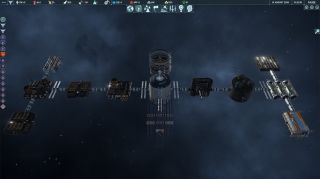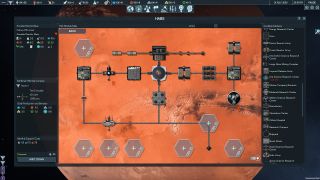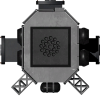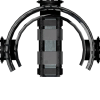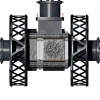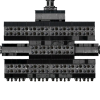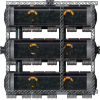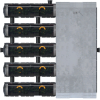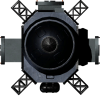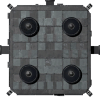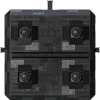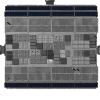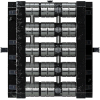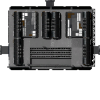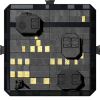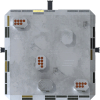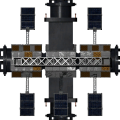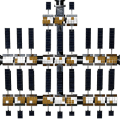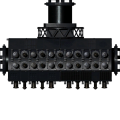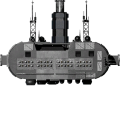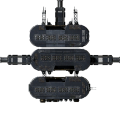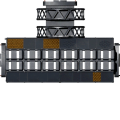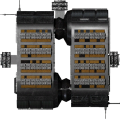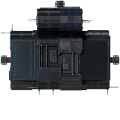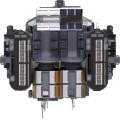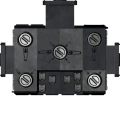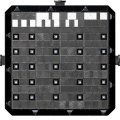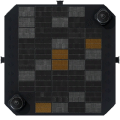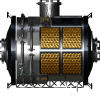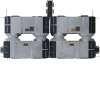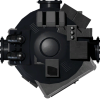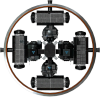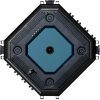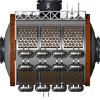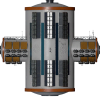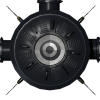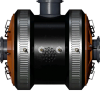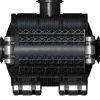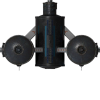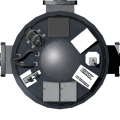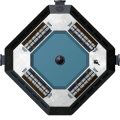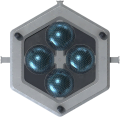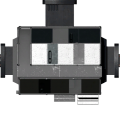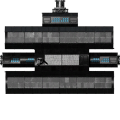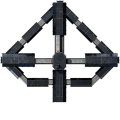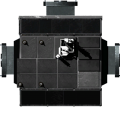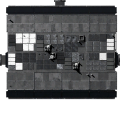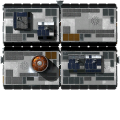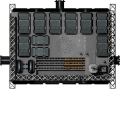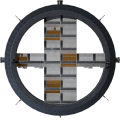Habs: Difference between revisions
| Line 373: | Line 373: | ||
! colspan=2 | Tier 1 !! colspan=2 | Tier 2 !! colspan=2 | Tier 3 | ! colspan=2 | Tier 1 !! colspan=2 | Tier 2 !! colspan=2 | Tier 3 | ||
|- | |- | ||
! Module | ! width=1% | Module | ||
! Effects | |||
! width=1% | Module | |||
! Effects | |||
! width=1% | Module | |||
! Effects | |||
|- | |- | ||
| Energy Lab<br>[[File:Station T1 EnergyLab.png| | | Energy Lab<br>[[File:Station T1 EnergyLab.png|100px]] | ||
| +3 Crew<br>+5 Research<br>+3% Energy Research<br>-8 Power<br>+3% Boost priority effect if in Earth orbit (max +30%) | | +3 Crew<br>+5 Research<br>+3% Energy Research<br>-8 Power<br>+3% Boost priority effect if in Earth orbit (max +30%) | ||
| Energy Research Center<br>[[File:Station T2 EnergyResearchCenter.png| | | Energy Research Center<br>[[File:Station T2 EnergyResearchCenter.png|100px]] | ||
| +25 Crew<br>+10 Research<br>+10% Energy Research<br>-32 Power<br>+6% Boost priority effect if in Earth orbit (max +30%) | | +25 Crew<br>+10 Research<br>+10% Energy Research<br>-32 Power<br>+6% Boost priority effect if in Earth orbit (max +30%) | ||
| Energy Institute<br>[[File:Station T3 EnergyInstitute.png| | | Energy Institute<br>[[File:Station T3 EnergyInstitute.png|100px]] | ||
| +125 Crew<br>+20 Research<br>+25% Energy Research<br>-96 Power<br>+10% Boost priority effect if in Earth orbit (max +30%) | | +125 Crew<br>+20 Research<br>+25% Energy Research<br>-96 Power<br>+10% Boost priority effect if in Earth orbit (max +30%) | ||
|- | |- | ||
| Information Science Lab<br>[[File:Station T1 InformationScienceLab.png| | | Information Science Lab<br>[[File:Station T1 InformationScienceLab.png|100px]] | ||
| +3 Crew<br>+5 Research<br>+3% Information Science Research<br>-6 Power<br>+3% Knowledge priority effect if in Earth orbit (max +30%) | | +3 Crew<br>+5 Research<br>+3% Information Science Research<br>-6 Power<br>+3% Knowledge priority effect if in Earth orbit (max +30%) | ||
| Information Science Research Center<br>[[File:Station T2 InformationScienceResearchCenter.png| | | Information Science Research Center<br>[[File:Station T2 InformationScienceResearchCenter.png|100px]] | ||
| +25 Crew<br>+10 Research<br>+10% Information Science Research<br>-24 Power<br>+6% Knowledge priority effect if in Earth orbit (max +30%) | | +25 Crew<br>+10 Research<br>+10% Information Science Research<br>-24 Power<br>+6% Knowledge priority effect if in Earth orbit (max +30%) | ||
| Information Science Institute<br>[[File:Station T3 InformationScienceInstitute.png| | | Information Science Institute<br>[[File:Station T3 InformationScienceInstitute.png|100px]] | ||
| +125 Crew<br>+20 Research<br>+25% Information Science Research<br>-72 Power<br>+10% Knowledge priority effect if in Earth orbit (max +30%) | | +125 Crew<br>+20 Research<br>+25% Information Science Research<br>-72 Power<br>+10% Knowledge priority effect if in Earth orbit (max +30%) | ||
|- | |- | ||
| Life Science Lab<br>[[File:Station T1 LifeScienceLab.png| | | Life Science Lab<br>[[File:Station T1 LifeScienceLab.png|100px]] | ||
| +3 Crew<br>+5 Research<br>+3% Life Science Research<br>-5 Power<br>+3% Welfare priority effect if in Earth orbit (max +30%) | | +3 Crew<br>+5 Research<br>+3% Life Science Research<br>-5 Power<br>+3% Welfare priority effect if in Earth orbit (max +30%) | ||
| Life Science Research Center<br>[[File:Station T2 LifeScienceResearchCenter.png| | | Life Science Research Center<br>[[File:Station T2 LifeScienceResearchCenter.png|100px]] | ||
| +25 Crew<br>+10 Research<br>+10% Life Science Research<br>-20 Power<br>+6% Welfare priority effect if in Earth orbit (max +30%) | | +25 Crew<br>+10 Research<br>+10% Life Science Research<br>-20 Power<br>+6% Welfare priority effect if in Earth orbit (max +30%) | ||
| Life Science Institute<br>[[File:Station T3 LifeScienceInstitute.png| | | Life Science Institute<br>[[File:Station T3 LifeScienceInstitute.png|100px]] | ||
| +125 Crew<br>+20 Research<br>+25% Life Science Research<br>-60 Power<br>+10% Welfare priority effect if in Earth orbit (max +30%) | | +125 Crew<br>+20 Research<br>+25% Life Science Research<br>-60 Power<br>+10% Welfare priority effect if in Earth orbit (max +30%) | ||
|- | |- | ||
| Materials Lab<br>[[File:Station T1 MaterialsLab.png| | | Materials Lab<br>[[File:Station T1 MaterialsLab.png|100px]] | ||
| +3 Crew<br>+5 Research<br>+3% Materials Research<br>-5 Power<br>+3% Military priority effect if in Earth orbit (max +30%) | | +3 Crew<br>+5 Research<br>+3% Materials Research<br>-5 Power<br>+3% Military priority effect if in Earth orbit (max +30%) | ||
| Materials Research Center<br>[[File:Station T2 MaterialsResearchCenter.png| | | Materials Research Center<br>[[File:Station T2 MaterialsResearchCenter.png|100px]] | ||
| +25 Crew<br>+10 Research<br>+10% Materials Research<br>-20 Power<br>+6% Military priority effect if in Earth orbit (max +30%) | | +25 Crew<br>+10 Research<br>+10% Materials Research<br>-20 Power<br>+6% Military priority effect if in Earth orbit (max +30%) | ||
| Materials Institute<br>[[File:Station T3 MaterialsInstitute.png| | | Materials Institute<br>[[File:Station T3 MaterialsInstitute.png|100px]] | ||
| +125 Crew<br>+20 Research<br>+25% Materials Research<br>-60 Power<br>+10% Military priority effect if in Earth orbit (max +30%) | | +125 Crew<br>+20 Research<br>+25% Materials Research<br>-60 Power<br>+10% Military priority effect if in Earth orbit (max +30%) | ||
|- | |- | ||
| Military Science Lab<br>[[File:Station T1 MilitaryScienceLab.png| | | Military Science Lab<br>[[File:Station T1 MilitaryScienceLab.png|100px]] | ||
| +3 Crew<br>+5 Research<br>+3% Military Science Research<br>-5 Power<br>+0.03 Miltech if in Earth orbit (max +0.3) | | +3 Crew<br>+5 Research<br>+3% Military Science Research<br>-5 Power<br>+0.03 Miltech if in Earth orbit (max +0.3) | ||
| Military Science Research Center<br>[[File:Station T2 MilitaryScienceResearchCenter.png| | | Military Science Research Center<br>[[File:Station T2 MilitaryScienceResearchCenter.png|100px]] | ||
| +25 Crew<br>+10 Research<br>+10% Military Science Research<br>-20 Power<br>+0.06 Miltech if in Earth orbit (max +0.3) | | +25 Crew<br>+10 Research<br>+10% Military Science Research<br>-20 Power<br>+0.06 Miltech if in Earth orbit (max +0.3) | ||
| Military Science Institute<br>[[File:Station T3 MilitaryScienceInstitute.png| | | Military Science Institute<br>[[File:Station T3 MilitaryScienceInstitute.png|100px]] | ||
| +125 Crew<br>+20 Research<br>+25% Military Science Research<br>-60 Power<br>+0.1 Miltech if in Earth orbit (max +0.3) | | +125 Crew<br>+20 Research<br>+25% Military Science Research<br>-60 Power<br>+0.1 Miltech if in Earth orbit (max +0.3) | ||
|- | |- | ||
| Space Science Lab<br>[[File:Station T1 SpaceScienceLab.png| | | Space Science Lab<br>[[File:Station T1 SpaceScienceLab.png|100px]] | ||
| +3 Crew<br>+5 Research<br>+3% Space Science Research<br>-5 Power<br>+3% Mission Control priority effect if in Earth orbit (max +30%) | | +3 Crew<br>+5 Research<br>+3% Space Science Research<br>-5 Power<br>+3% Mission Control priority effect if in Earth orbit (max +30%) | ||
| Space Science Research Center<br>[[File:Station T2 SpaceScienceResearchCenter.png| | | Space Science Research Center<br>[[File:Station T2 SpaceScienceResearchCenter.png|100px]] | ||
| +25 Crew<br>+10 Research<br>+10% Space Science Research<br>-20 Power<br>+6% Mission Control priority effect if in Earth orbit (max +30%) | | +25 Crew<br>+10 Research<br>+10% Space Science Research<br>-20 Power<br>+6% Mission Control priority effect if in Earth orbit (max +30%) | ||
| Space Science Institute<br>[[File:Station T3 SpaceScienceInstitute.png| | | Space Science Institute<br>[[File:Station T3 SpaceScienceInstitute.png|100px]] | ||
| +125 Crew<br>+20 Research<br>+25% Space Science Research<br>-60 Power<br>+10% Mission Control priority effect if in Earth orbit (max +30%) | | +125 Crew<br>+20 Research<br>+25% Space Science Research<br>-60 Power<br>+10% Mission Control priority effect if in Earth orbit (max +30%) | ||
|- | |- | ||
| Xenology Lab<br>[[File:Station T1 XenologyLab.png| | | Xenology Lab<br>[[File:Station T1 XenologyLab.png|100px]] | ||
| +3 Crew<br>+5 Research<br>+10% Xenology Science Research<br>-5 Power<br>+1 Alien Detection if in Earth orbit (max +9) | | +3 Crew<br>+5 Research<br>+10% Xenology Science Research<br>-5 Power<br>+1 Alien Detection if in Earth orbit (max +9) | ||
| Xenoscience Research Center<br>[[File:Station T2 XenoscienceResearchCenter.png| | | Xenoscience Research Center<br>[[File:Station T2 XenoscienceResearchCenter.png|100px]] | ||
| +25 Crew<br>+10 Research<br>+25% Xenology Science Research<br>-20 Power<br>+2 Alien Detection if in Earth orbit (max +9) | | +25 Crew<br>+10 Research<br>+25% Xenology Science Research<br>-20 Power<br>+2 Alien Detection if in Earth orbit (max +9) | ||
| Xenoscience Institute<br>[[File:Station T3 XenoscienceInstitute.png| | | Xenoscience Institute<br>[[File:Station T3 XenoscienceInstitute.png|100px]] | ||
| +125 Crew<br>+20 Research<br>+50% Xenology Science Research<br>-60 Power<br>+3 Alien Detection if in Earth orbit (max +9) | | +125 Crew<br>+20 Research<br>+50% Xenology Science Research<br>-60 Power<br>+3 Alien Detection if in Earth orbit (max +9) | ||
|} | |} | ||
Revision as of 07:27, 6 July 2023
Habitats, or habs, are space-based facilities operated by factions. They are composed of modules. All modules have a core module; the size of the core determines the size of the hab. The size of the hab determines both how many modules you can have (4, 12 or 20, plus the core), and the maximum size of each module.
Habs may be founded in three ways. One is to launch the core module from Earth, using boost. This can take a lot of time if the location is far from the homeworld. A second is to develop and build kits that ships can deploy when they arrive in an orbit or land on a space body. A third is to found habs from other habs in the same planetary system that have a construction module.
Habs may be assaulted and captured by Marines from ships, although building barracks modules helps defend it. A councilor with a high command attribute leading an assault mission gives it a much greater chance of success.
Habs, like fleets, belong directly to a faction. Your hab may be nominally operating under NASA or the United Nations, but what matters is that its people are really working for The Academy, The Resistance, Project Exodus, etc.
Habs have a support cost drawn from space resources. If those are insufficient Boost is used. And if you are out of both, or have insufficient mission control, your hab is much more likely to suffer accidents, and be much more willing to switch allegiance to another faction.
Life Support
Each human at a hab requires 0.029 water and 0.029 volatiles per month. (This cost is normally included in the listed upkeep for each module.)
Stations
Stations are built in an orbit. If a station has defenses it can be involved in combat, where the enemy's objective will be to destroy the modules. After the battle, the station can be boarded or destroyed.
When the game starts there are two existing tier 1 stations, each with a unique orbit around Earth: The International Space Station (controlled by the Academy), with two Solar Collectors and one Space Science Lab, and Tiangong Station (controlled by Project Exodus), with no modules beyond the core.
Stations use the following core modules. They require the council engineering project with the same name to be constructed.
Particle Colliders
Particle Colliders are used to produce antimatter. They also produce Energy Research but once the bonus goes above 50% it suffers diminishing returns.
Antimatter Capture
Antimatter capture modules can only be constructed in orbits that have antimatter. Only one antimatter capture module can operate in each antimatter orbit, regardless of faction.
Note that antimatter stats in an orbit are given in micrograms per year, whereas the units of production for most other production facilities are given in units of dekatons per month. That means that each point of antimatter in an orbit is 1/120,000,000,000,000 units per month, or 8.3 femto-units, even with the 100% efficient Antimatter Farm doing the harvesting. Since the largest antimatter value in the solar system is Mimas, at 880, this means that the best possible production from an antimatter capture facility is is 7.3 pico-units per month.
Campaign Modules
Campaign Modules are tier 3 modules that can only be constructed by certain factions once certain campaign objectives have been completed. Constructing it will allow the faction to complete its final objective.
Bases
Bases are built at a hab site. Hab sites are discovered by launching a prospector probe after the required technology has been researched.
Bases use the following core modules. They require the council engineering project with the same name to be constructed.
Mining Complexes
Each base will have a Mining Deposit Access Point above the Core Module. Only Mining Complex modules can be constructed on it, which will produce the resources of the hab site. Its construction cost and power consumption scale with the escape velocity of the celestial body and its distance from Earth.
There is a soft limit on the number of mining bases you can have. Starting at 13 mines on different celestial bodies, extra MC is charged for each new one. As far as the mining limit is concerned, every base on e.g., Mars counts as one base only. This makes asteroid mining more expensive in terms of MC than mining on larger objects.
Modules
Most hab modules consume power. You must build sufficient power-generating modules to accommodate your other modules. Modules may be turned off to reduce power consumption, although certain modules must remain on if there is power to support them in the hab.
Hab modules are added to habs either by shipping them from Earth using boost or building them out of space materials. Some modules have upgrade paths to larger versions; upgrading a module in this way is done at a discount.
Power Modules
Power Modules produce Power to the hab. Solar power modules are inefficient if the hab is built in the L-2 Lagrage Point as it will lie in the planet's shadow.
Defense Modules
Defense modules houses weapons to defend habs against enemy assault.
When built on the surface, they house 2 surface-to-orbit laser cannons (laser / arc laser / phaser). Small, large, or huge cannons are used according to module tier. They upgrade automatically when the new global techs are researched.
When built in space, they house 2 anti-ship weapons: 1 laser battery (laser / arc laser / phaser) and 1 projectile battery (gun / rail / coil / plasma). In addition, they also house 1 point defense turret (laser / arc laser / phaser). Light, regular/medium, or heavy batteries are used according to module tier. Unlike modules built on the surface, batteries and point defense faction projects need to be researched to upgrade space defense module weapons.
Science Modules
Science Modules produce Research in a certain field and have additinal effects if built in Earth interface orbit. Once the research bonus goes above 50% it suffers diminishing returns.
Civilian Modules
Civilian Modules must be constructed either in stations in Earth orbit or on bases on celestial bodies with at least 50000 population. They cannot be build in irradiated locations.
Deep Space Telesope
The Deep Space Telesope is a tier 2 module only available to the ![]() Project Exodus faction for its objectives. Its stats are comparable to the Space Science Research Center module.
Project Exodus faction for its objectives. Its stats are comparable to the Space Science Research Center module.
Finding the UI
Once you have the prerequisites of a Hab space station, deselect (click x) on any agents. Zoom out until the boarders and icons on Earth aren't shown. Then click on Earth, it will zoom in a bit and a small icon of a space station with a + will appear at the bottom where commands normally are.
| Terra Invicta mechanics | |
|---|---|
| Factions | |
| Council | |
| Earth | |
| Space | |
| Modding | Mod tools • Console Commands |
 Hooded Horse Wikis
Hooded Horse Wikis